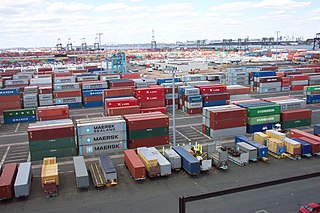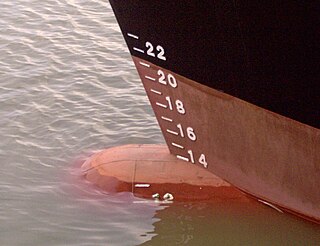
Containerization is a system of intermodal freight transport using intermodal containers. Containerization is also referred as "Container Stuffing" or "Container Loading", which is the process of unitization of cargoes in exports. Containerization is the predominant form of unitization of export cargoes, as opposed to other systems such as the barge system or palletization. The containers have standardized dimensions. They can be loaded and unloaded, stacked, transported efficiently over long distances, and transferred from one mode of transport to another—container ships, rail transport flatcars, and semi-trailer trucks—without being opened. The handling system is completely mechanized so that all handling is done with cranes and special forklift trucks. All containers are numbered and tracked using computerized systems.

Seamanship is the art, knowledge and competence of operating a ship, boat or other craft on water. The Oxford Dictionary states that seamanship is "The skill, techniques, or practice of handling a ship or boat at sea."

A container ship is a cargo ship that carries all of its load in truck-size intermodal containers, in a technique called containerization. Container ships are a common means of commercial intermodal freight transport and now carry most seagoing non-bulk cargo.

The Wayfarer is a wooden or fibreglass hulled fractional Bermuda rigged sailing dinghy of great versatility; used for short 'day boat' trips, longer cruises and for racing. Over 11,000 have been produced as of 2016.

The Huddersfield Broad Canal or Sir John Ramsden's Canal, is a wide-locked navigable canal in West Yorkshire in northern England. The waterway is 3.75 miles (6 km) long and has 9 wide locks. It follows the valley of the River Colne and connects the Calder and Hebble Navigation at Cooper Bridge junction with the Huddersfield Narrow Canal near Aspley Basin in Huddersfield.

The Stort Navigation is the canalised section of the River Stort running 22 kilometres (14 mi) from the town of Bishop's Stortford, Hertfordshire, downstream to its confluence with the Lee Navigation at Feildes Weir near Rye House, Hoddesdon, Hertfordshire.

A bulk carrier or bulker is a merchant ship specially designed to transport unpackaged bulk cargo — such as grains, coal, ore, steel coils, and cement — in its cargo holds. Since the first specialized bulk carrier was built in 1852, economic forces have led to continued development of these ships, resulting in increased size and sophistication. Today's bulk carriers are specially designed to maximize capacity, safety, efficiency, and durability.

Deadweight tonnage or tons deadweight (DWT) is a measure of how much weight a ship can carry. It is the sum of the weights of cargo, fuel, fresh water, ballast water, provisions, passengers, and crew.

A third mate (3/M) or third officer is a licensed member of the deck department of a merchant ship. The third mate is a watchstander and customarily the ship's safety officer and fourth-in-command. The position is junior to a second mate. Other duties vary depending on the type of ship, its crewing, and other factors.
Protection and indemnity insurance, more commonly known as P&I insurance, is a form of mutual maritime insurance provided by a P&I club. Whereas a marine insurance company provides "hull and machinery" cover for shipowners, and cargo cover for cargo owners, a P&I club provides cover for open-ended risks that traditional insurers are reluctant to insure. Typical P&I cover includes: a carrier's third-party risks for damage caused to cargo during carriage; war risks; and risks of environmental damage such as oil spills and pollution. In the UK, both traditional underwriters and P&I clubs are subject to the Marine Insurance Act 1906.

Bulk cargo is commodity cargo that is transported unpackaged in large quantities.
The law of general average is a principle of maritime law whereby all stakeholders in a sea venture proportionately share any losses resulting from a voluntary sacrifice of part of the ship or cargo to save the whole in an emergency. For instance, should the crew jettison some cargo overboard to lighten the ship in a storm, the loss would be shared pro rata by both the carrier and the cargo-owners.

The National Cargo Bureau (NCB) a not-for-profit marine surveying organization charged with assisting the U.S. Coast Guard with carrying out the provisions of the International Convention for the Safety of Life at Sea. The NCB was formed by a group of marine underwriters and the Coast Guard for the purpose of reducing losses of grain ships. Any ship loading grain in the US sailing for a foreign port must have a certificate issued by the NCB in order to sail( See U.S. Coast Guard Navigation and Vessel Inspection Circular No. 5-94 - NVIC 05-94 ). The NCB acts with and enforces the regulations of the Coast Guard in this area. Grain ships have unique stability issues and are prone to capsize if loaded improperly. Headquartered in New York City, the NCB has offices throughout United States.

Workington Bridge railway station was situated at the northern end of Workington Bridge next to the River Derwent, and was originally served by the Cockermouth and Workington Railway, later absorbed by the London and North Western Railway; the road at the north end of the bridge having to be raised to allow the railway to pass under it. It served eastern Workington, Cumberland, England.

A sailing yacht, is a leisure craft that uses sails as its primary means of propulsion. A yacht may be a sail or power vessel used for pleasure, cruising, or racing. There is no standard definition, so the term applies here to sailing vessels that have a cabin with amenities that accommodate overnight use. To be termed a "yacht", as opposed to a "boat", such a vessel is likely to be at least 33 feet (10 m) in length and have been judged to have good aesthetic qualities. Sailboats that do not accommodate overnight use or are smaller than 30 feet (9.1 m) are not universally called yachts. Sailing yachts in excess of 130 feet (40 m) are generally considered to be superyachts.

Northrepps is a village and a civil parish in the English county of Norfolk. It is 3.4 miles (5.5 km) southeast of Cromer, 22.2 miles (35.7 km) north of Norwich and 137 miles (220 km) north of London. The village lies west of the A149 which runs between Kings Lynn and Great Yarmouth. The nearest railway station is at Cromer for the Bittern Line which runs between Sheringham, Cromer and Norwich. The nearest airport is Norwich International Airport. The village and parish of Northrepps had in the 2001 census a population of 839, increasing to 886 at the 2011 Census. For the purposes of local government, the village falls within the district of North Norfolk.

In shipping, break-bulk, breakbulk, or break bulk cargo, also called general cargo, refers to goods that are stowed on board ship in individually counted units. Traditionally, the large numbers of items are recorded on distinct bills of lading that list them by different commodities. This is in contrast to cargo stowed in modern intermodal containers as well as bulk cargo, which goes directly, unpackaged and in large quantities, into a ship's hold(s), measured by volume or weight.

The Pilmoor, Boroughbridge and Knaresborough Railway was a railway line in North Yorkshire, England, that connected Pilmoor on the East Coast Main Line with the towns of Boroughbridge and Knaresborough. The first part of the branch headed south-westwards from the East Coast Main Line and terminated at Boroughbridge. In 1875, the branch was extended again to meet the line at Knaresborough.
A draft survey is a calculation of the weight of cargo loaded or unloaded to or from a ship from measurents of changes in its displacement. The technique is based on Archimedes' principle. The procedure is standardized by the United Nations Economic Commission for Europe for the measurement of coal cargoes.

Stowage plan for container ships or bay plan is the plan and method by which different types of container vessels are loaded with containers of specific standard sizes. The plans are used to maximize the economy of shipping and safety on board.















